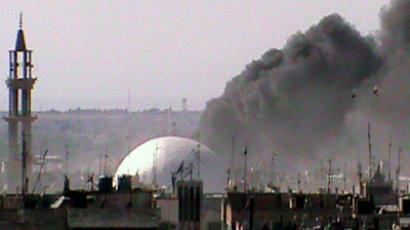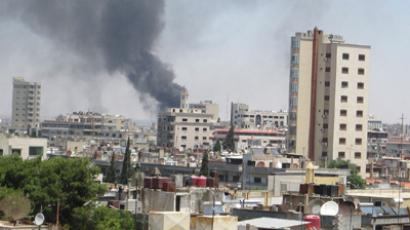Ship bound for Syria was carrying 3 old helicopters repaired in Russia - Lavrov
Foreign Minister Sergey Lavrov has confirmed in an exclusive interview to RT that a Russian ship bound for Syria was carrying 3 Syrian helicopters that had been repaired in Russia.
RT: The Western media this week has been frenzied about Russia sending warships and helicopters to Syria. How do you react to that?Sergey Lavrov: It was part of a campaign and not a very decent campaign, I would say. We are sending no battleships to Syria. We have been saying publicly that we have been implementing contracts under which we have to supply arms to Syria. Those armaments are entirely defensive and they mostly consist of air defense systems, which cannot be used against the population and can only be used to respond to outside aggression.The ship which is being discussed these days was indeed carrying air defense systems. It was carrying three helicopters which had been repaired in Russia under contracts signed in 2008. Those are Soviet helicopters. They have been in Syria from Soviet days. In 2008 there was a contract to repair them. They are still to be assembled after delivery. The entire process will take no less than three months.
'[Helicopters] are still to be assembled after delivery. The entire process will take no less than three months,' – Lavrov.
So to speak about something we have just sold to Syria and which is being used in action is not true at all.But this story has another twist with the British insurance company, which decided to withdraw insurance from this particular ship. This is a testimony that the insurance system of Great Britain is not reliable, because they were citing sanctions imposed on Syria unilaterally by the EU. This means that anyone – any country or any company – who is not violating any international rules, who is not violating any UN Security Council resolutions might be subject to extra-territorial application of somebody else’s unilateral sanctions. This is a very slippery slope.I do believe we have to discuss the issue of unilateral sanctions in a systematic manner: what they mean and what can be done to make those who faithfully implement international law, including UNSC resolutions, not be subject to application of somebody else’s rules.
'In principle dealing with any international issue you need to include partners with whom you have difficulties, not isolate them. Isolation never works,' – Lavrov.
Bad examples are contagious. It was until recently the US which was resorting to unilateral sanctions to punish countries every now and then, including sanctions with extra-territorial application. Now unfortunately the EU is taking the cue, beginning to use sanctions in a unilateral manner more and more against Syria, but also against some other cases. This is a trend which is counter-productive. In principle dealing with any international issue you need to include partners with whom you have difficulties, not isolate them. Isolation never works.
RT: We are hearing reports of a clemency for President Assad from the West if he steps down, some kind of immunity, how would Russia react to that?SL: I would just repeat what I said: it's for the Syrian people to decide who should rule them, how they should live. The main thing for the external players is to ensure that they all sit down at the negotiating table to discuss their future, where the minority and the majority will feel safe and included into the political system, otherwise the groups that now support president Assad, and there are quite a number who do so, would be in the opposition to the ruling majority and the war and violence would continue, but the positions of the participants would be shifted. This is something that might happen if people insist on one-sided approaches to the crisis and on imposing something on the Syrians.RT: Some would argue that this was the case in Libya, where a hundred people were killed just this week alone. Obviously this is not what people thought they were fighting for in the previous year’s uprising against Muammar Gaddafi. Is this the same fate that Syria has if there is some kind of an intervention?SL: It could not be the same, because there would be no resolution of the UN Security Council authorizing outside interference.
'There would be no resolution of the UN Security Council authorizing outside interference,' – Lavrov.
RT: In terms of the aftermath of any kind of intervention for the people?SL: I think intervention in Syria would be disastrous for the region. Syria is a multi-ethnic, multi-confessional country, whose different confessional groups have close relations to sister confessional groups in other countries. Lebanon has already been influenced by the Syrian developments. Inter-ethnic clashes and strife can take place very fast and can embrace the entire region. The Kurdish problem: the Kurds live in Syria, Turkey, in Iraq and other countries.The problem of Christians: Christians in Egypt have been subject to some violence. It is very dangerous. They have been living there for centuries.To topple this balance would be catastrophic.RT: British Prime Minister David Cameron says that in Los Cabos at the G20 meeting President Vladimir Putin shifted his view on the situation in Syria. Is that true?SL: It is not true. The meetings with UK PM David Cameron and US President Barack Obama did discuss Syria. Both our partners said President Bashar Al-Assad must go and external players must develop a transition plan for the Syrians to agree. We expressed our position that we cannot accept a policy which would aim at changing regimes from the outside. This has been our position all along. We also cannot prejudge for the Syrians what the outcome of the political dialogue would be. We strongly support a political dialogue and efforts to stop the violence. We suggest for this purpose that all external players should lean on the Syrian party on which they have influence and thus persuade them to withdraw from cities – both the government and opposition – to sit down and have a dialogue. But there should be no prejudging from outside what the substance and result of this dialogue might be. It’s for the Syrians to decide.I have seen the statement made by PM Cameron that President Putin shifted his position after meetings in Los Cabos. It is not true at all. President Putin was asked in Los Cabos himself at his press conference about his position on Syria. He expressed it exactly the way he did with David Cameron and Barack Obama.














